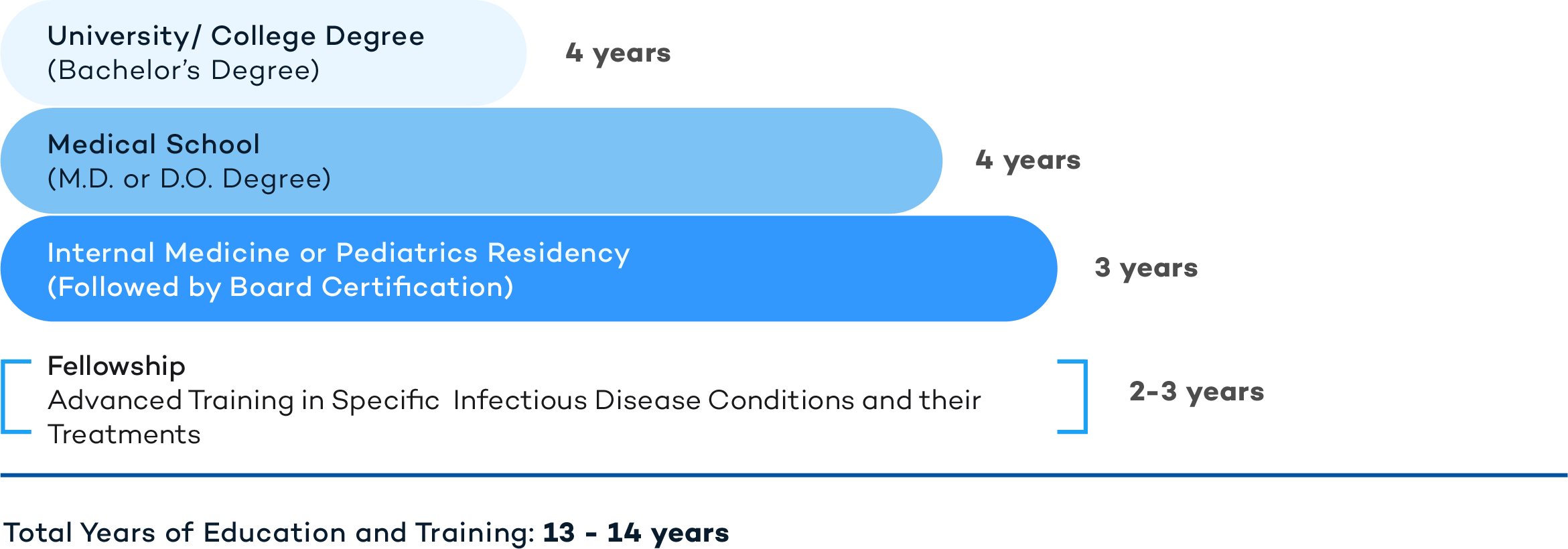

An Infectious Disease Doctor is a Board-Certified Physician who completed residency training in Internal Medicine, plus additional in-depth fellowship training in Infectious Disease. This specialist treats and diagnoses all conditions related to infections as well as the infestations of the human body that may be caused by bacteria, viruses, fungus, and other organisms like parasites, that can invade the body. They are experts in infections that can be acquired in the community and more aggressive infections that affect hospitalized patients. They can treat acute infections as well as chronic infections such as HIV/AIDS, tuberculosis, Lyme disease, and hepatitis. Infectious Disease specialists are also experts in parasitic infections, tropical medicine, and travel medicine.
Infectious Disease Doctors have extensive expertise in reviewing your physical exam and laboratory data to identify infectious causes of symptoms, and choose the right antibiotics, anti-viral, or anti-microbial therapies to treat or manage the infection. Proper treatment protocols are imperative due to the emergence of resistant strains of infectious organisms.
Medical doctors who specialize in Infectious Disease undergo a strict educational and training curriculum; in order to acquire the level of expertise required to provide you with the highest level of medical care. These specialists complete a full residency in Internal Medicine or Pediatrics prior to completing an advanced specialized fellowship training program.
The following table illustrates the training requirements of a physician trained in Infectious Diseases.

INFECTIO from the Latin word for ‘infectionem’ meaning infection or contagion + LOGY from the Greek word ‘logia’ which means ‘logic’ or ‘the study of’.
Infectious Disease physicians Doctors treat an extensive list of infections, including:
Bacterial Infections: that can infect any organ of the body producing skin infections, bone and joint infections, meningitis, heart valves infections, urinary tract infections, and pneumonia, among numerous other infections. Infectious Disease Physicians are experts in guiding antibiotic therapy and addressing antibiotic-resistant bacteria, including Methicillin-Resistant Staphylococcus Aureus, or MRSA.
Viral Infections: include those conditions produced by viruses that may produce acute infections or chronic infections such as HIV and hepatitis B and C that require long-term management. Other significant viral infections include forms of viral pneumonia (inflammation and infection of the lungs caused by viruses), such as that seen with seasonal influenza and more recently COVID-19 infection.
Lyme Disease: is an infection caused by a microorganism species called Rickettsia. Early identification and prompt treatment is important to prevent long-term complications, such arthritis, heart disease and generalized debilitating illness.
Fungal Infections: can frequently infect skin and soft tissues but can also cause systemic disease such as coccidiomycosis and blastomycosis. Identification of these infections can pose a diagnostic challenge where the Infectious Disease Physician may be very helpful.
Malaria: is considered a tropical disease caused by a parasite introduced into the body by a mosquito bite in tropical regions. In addition to malaria, Infectious Disease physicians have special expertise in other tropical parasitic diseases and travel medicine.
Vaccines: and public health are areas of specialization that fall under the Infectious Disease physician’s expertise.
Tuberculosis and Leprosy: are infections that can affect the lungs, skin and other organs in advanced disease.
Due to the time sensitive, contagious, and personal nature of infectious disease, it is important that you choose a physician that you feel comfortable with, and are able to easily communicate with. Your Primary Healthcare Provider (Internal Medicine or Family Medicine) can facilitate a referral to the Infectious Disease specialist when necessary, and you can also do your due diligence by checking the credentials and practice style of the doctor. At myDoqter, you have access to patient feedback about doctors, and you can also see the professional recommendations given by other physicians who have witnessed first-hand the expertise and professional competency of your doctor.
For more information on Infectious Diseases you can visit the following sites:
https://www.ama-assn.org/specialty/infectious-diseases
https://www.mayoclinic.org/diseases-conditions/infectious-diseases/diagnosis-treatment/drc-20351179